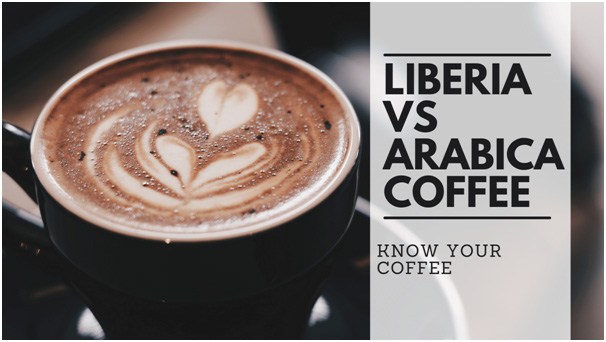Both types of Arabica and Liberica coffee beans come from the same roasters. However, they make very different espressos. Arabica boasts a subtle, light flavor. It is traditionally served in espresso bars throughout Switzerland and Austria. Liberica is known for its robust flavor. It is typically served in cafes and cafes-snack bars in Austria and southern Germany for traditional Viennese coffee.

Coffee lovers often debate about which is better: Arabica or Liberia coffee? You thought you might know the difference by now, but we’re here to share everything you ever wanted to know about this coffee category and more.
So let’s get started…
Characteristics Of Liberia Coffee Beans That Makes It Different Than Arabica
Liberica coffee beans have a robust flavor due to their higher caffeine and fatty acid content than regular Arabica beans. These differences give Liberica beans their distinctively strong taste.
The beans are roasted over longer and hotter temperatures than regular Arabica coffee beans, creating less acidity and more caffeine and fatty acids. The beans are also ground longer and coarser than regular Arabica beans for a thicker crema and more robust brew.
How Do You Know If The Coffee Beans Are Arabica Or Liberica?
You can buy Liberica coffee in loose beans or ground coffee from most retailers in Austria and Switzerland. If you are only ordering coffee online, look for the country of origin; all coffee from Austria and Switzerland is Liberica, regardless of where it was roasted or packaged. When buying in bulk, make sure you double-check the origin before ordering!
Origin: The coffee is grown in the Republic of Liberia in West Africa and is one of only two countries that produce a high-quality coffee bean. The country only produces about 3% of the world’s total coffee supply but makes up over 30% of the world’s high-quality coffee supply.
How Does Liberia Coffee Taste?
Liberica coffee beans are of robust and full-bodied flavor. It is known as a “dark roast” coffee because it is darker than other coffee roasts.
This robust flavor has been popular in cafes throughout Germany and Austria since the 19th century. Just like the traditional Vienna coffee, a spoonful of sugar is often enjoyed with a glass of Liberia coffee.
Cafes-snack shops in Austria and southern Germany serve this coffee both as an espresso and brewed as a caffe latte or cappuccino. Some even serve it as a substitute for coffee with milk and sugar, as it is often preferred by younger coffee connoisseurs.
Characteristics Of Arabica Coffee Beans That Make It Different Than Liberia Coffee Beans

The flavor of Arabica coffee beans is much subtler than that of Liberica coffee beans. The beans are also roasted over a shorter time and at cooler temperatures, creating a more acidic and less acidic taste than regular Liberica beans.
As with Liberica beans, the Arabica beans are ground much finer and longer, yielding a thinner crema and milder flavor than regular Liberica beans.
The beans are often roasted darker than other coffees, creating a strong flavor and thick crema. The beans are often served as an espresso shot, but it can also be brewed as a drip or Moka pot. Like Liberica coffee, a spoonful of sugar is often enjoyed with a glass of Arabica coffee.
How To Serve Coffee To Taste The Difference In Flavors
Though both Arabica and Liberica coffee beans are roasted in similar ways, they serve unique purposes. Arabica coffee is lighter in flavor and higher in acidity than Liberica coffee, making it an ideal flavor for coffee connoisseurs who prefer a lighter brew.
Liberica coffee beans are stronger in flavor and higher in caffeine and fatty acids than Arabica coffee beans, making it the ideal flavor of robust coffee and coffee for younger coffee aficionados who prefer a stronger brew.
How To Brew A Cup Of Liberia Or Arabica Coffee Beans
When brewing a cup of Liberia or Arabica coffee, there are a few differences to keep in mind.
1. Always use the correct amount of beans and water. Use a French press to make a strong, robust cup of coffee. Use an espresso machine for a strong, dark cup of coffee. Use an AeroPress for a light-bodied cup of coffee. Always use freshly ground beans for the best flavor.
2. Be careful not to over-brew your coffee. Coffee brewed for too long will become bitter and acidic, so it’s best to remember the age-old saying “less is more” when brewing.
3. Always enjoy a glass of water with your coffee. Coffee is dehydrating and caffeine is dehydrating, so be sure to stay hydrated throughout the day and enjoy a glass of water with your cup of Arabica or Liberica coffee to stay hydrated throughout the day.
4. Keep the heat and amount of sugar down when brewing Arabica or Liberica coffee. These brews are stronger in flavor and caffeine than regular coffee, so it’s best to keep the sugar and heat down when brewing these coffees for the best results. Because both coffees are considered dark roasts, they are also usually served with sugar or milk instead of cream or sugar. Simply add the desired amount of sugar or milk and heat until hot before enjoying!
Purchasing Liberica Coffee Beans
You can easily find Liberian coffee beans in any Austrian or German deli or grocery store. For a more delicate taste, you may opt for Arabica beans or blend the two together for a blend that perfectly fits your taste preferences! Both types come from the same roasters, but they make very different espressos.
What Are The Most Popular Versions Of Liberica Coffee?
Light: Traditional black and decaffeinated black coffee made with 100% Liberian coffee. A hint of vanilla and caramel in each cup.
Dark: Traditional black and decaffeinated black coffee made with 100% Liberian coffee. Full-bodied and intense taste in every cup.
Vienna: Dark Vienna coffee made with 100% Liberica coffee beans for an intense coffee taste for any coffee connoisseur.
It can be served with or without milk or sugar.
Medium: Light, but the full-bodied taste made with 100% Liberica coffee beans for a smooth, smooth taste in every cup. An excellent choice for any coffee drinker.
This can be served with or without milk or sugar.
Low caffeine: A caffeine-free coffee made with 100% Liberica coffee beans and a light, smooth taste in every cup. An excellent choice for any coffee connoisseur.
Is Liberica Coffee Rare?
No, this is not a rare coffee at all! In fact, it is one of the most popular coffees in Austria and Germany.
In Austria, Liberica coffee is an important export product. In fact, it accounts for about 20% of all coffee exports from Switzerland and Austria combined.
Why Is Liberica Coffee So Popular In Austria And Germany?
Liberica coffee was first grown in what is now Italy and southern Germany in the 17th century. Decades later, in 1798, a coffee roaster began offering the Robusta beans as a special product in Vienna, Austria. The Robusta beans (which develop a stronger flavor) quickly gained popularity throughout Austria and Germany and people began mixing them with Arabica coffee to create a robust and full-bodied brew.
This blend is still popular today in Austria and Germany due to its impressive robust flavor, which attracts younger drinkers who are typically looking for a darker roast coffee and a darker crema.
In the final analysis of Liberica vs Arabica coffee…
Both Arabica and Liberica coffee beans are high-quality coffee beans that yield strong and bold flavors in their respective brews. They are both roasted in similar ways and share the same origins, so it’s no surprise that many people prefer blending the two together to create a cup of coffee that perfectly suits their taste preferences!
So the next time you are in an out-of-country grocery store or deli and come across a jar of Liberia coffee beans, don’t be afraid to purchase them!




